Key takeaways
- Republican campaigns resonate by emphasizing core values like limited government, personal freedom, and economic opportunities through personal engagement and storytelling.
- Grassroots strategies, including community meetings and open dialogue, are crucial for building trust and mobilizing support for initiatives.
- Effective communication techniques, such as framing messages around shared values and encouraging open-ended discussions, enhance community engagement and understanding.
- Hosting informal events fosters genuine connections and trust, highlighting personal stories that bring political principles to life.
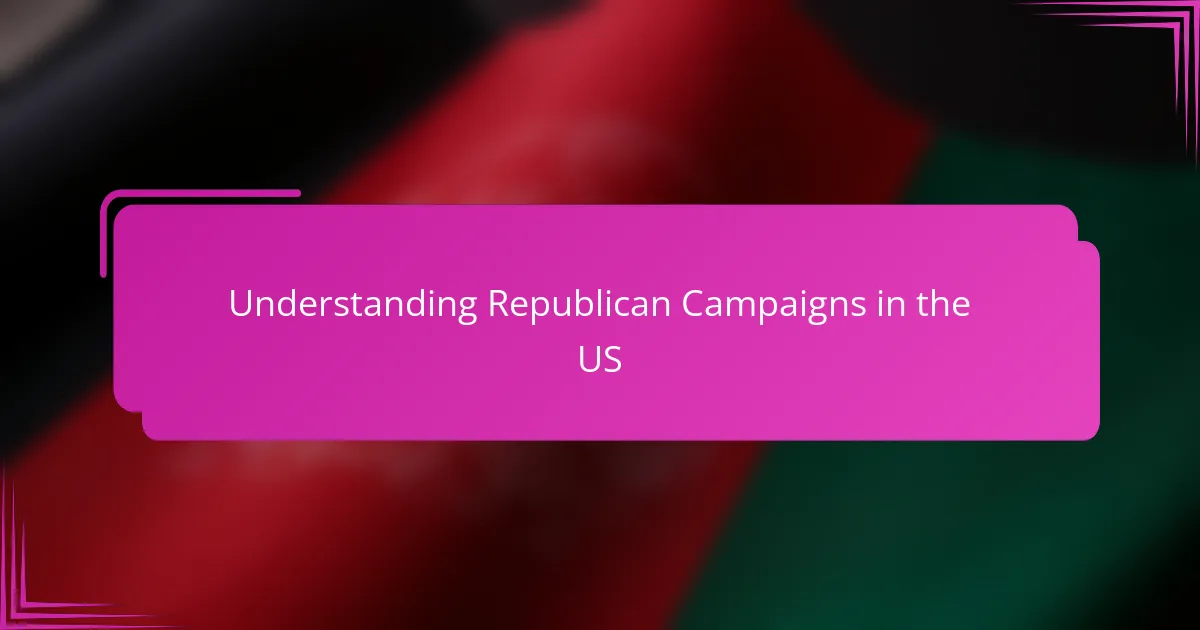
Understanding Republican Campaigns in the US
Republican campaigns in the US often focus on core values like limited government, individual freedom, and economic growth. From my experience volunteering at local rallies, these themes resonate deeply with many community members who feel a strong sense of patriotism and responsibility. Have you ever noticed how these campaigns emphasize personal stories to connect on a human level, not just policies?
What struck me most is the strategic use of grassroots efforts—door-to-door canvassing, phone banking, and community events. It’s not just about big speeches; it’s about building trust one conversation at a time. When I knocked on my neighbor’s door and shared why I supported a certain initiative, I understood how powerful personal engagement can be in shaping opinions.
Another key element is the messaging around fiscal conservatism and law and order, which often sparks passionate debates. I recall one community forum where a heated but respectful discussion unfolded, revealing just how invested people are in these issues. It made me realize that understanding these campaigns requires listening as much as speaking.
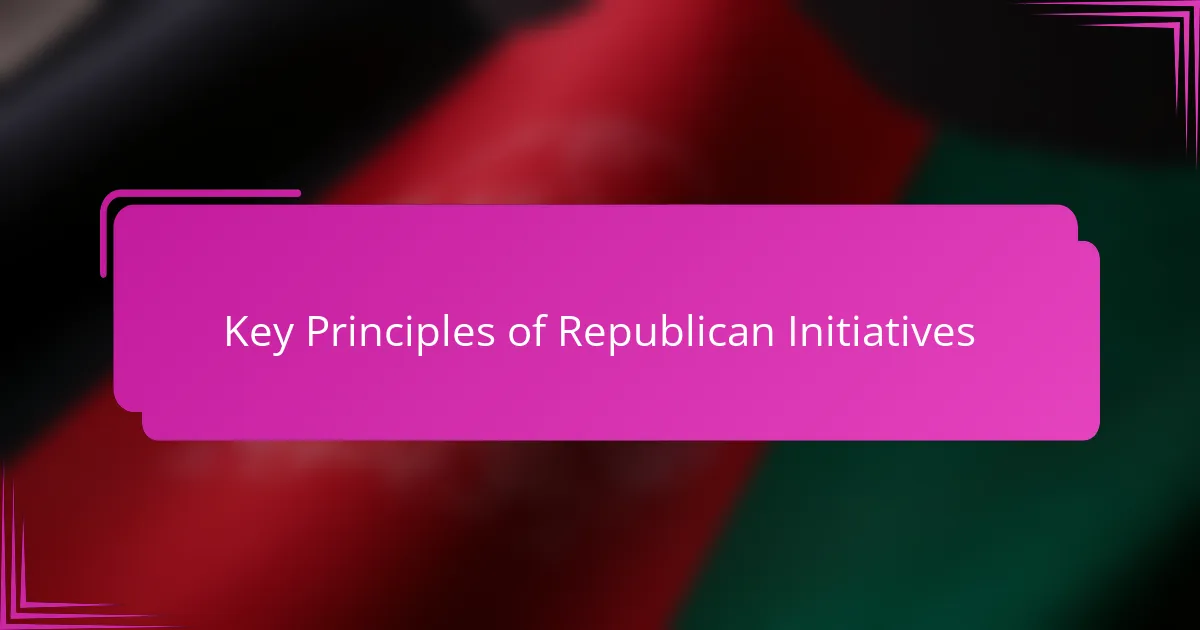
Key Principles of Republican Initiatives
What really stands out to me about Republican initiatives is their strong focus on limited government. Don’t you find it interesting how many people in my community appreciate the idea that less government interference can lead to more personal freedom? When I talk to neighbors, they often express relief at policies that aim to reduce bureaucracy and let individuals make their own choices.
Economic growth is another cornerstone that I’ve seen consistently drive enthusiasm. It’s not just numbers on a chart; it’s about creating opportunities for families to thrive. I remember a local entrepreneur sharing how tax cuts and deregulation helped her expand her small business—that personal success story made the broader economic principles feel tangible and real.
Then there’s the emphasis on law and order, which can ignite strong emotions. It’s clear to me that for many folks, feeling safe in their community is non-negotiable. That’s why I’ve participated in neighborhood meetings where we discussed community policing initiatives—those conversations left me reflecting on how crucial these principles are to daily life, beyond the political slogans.
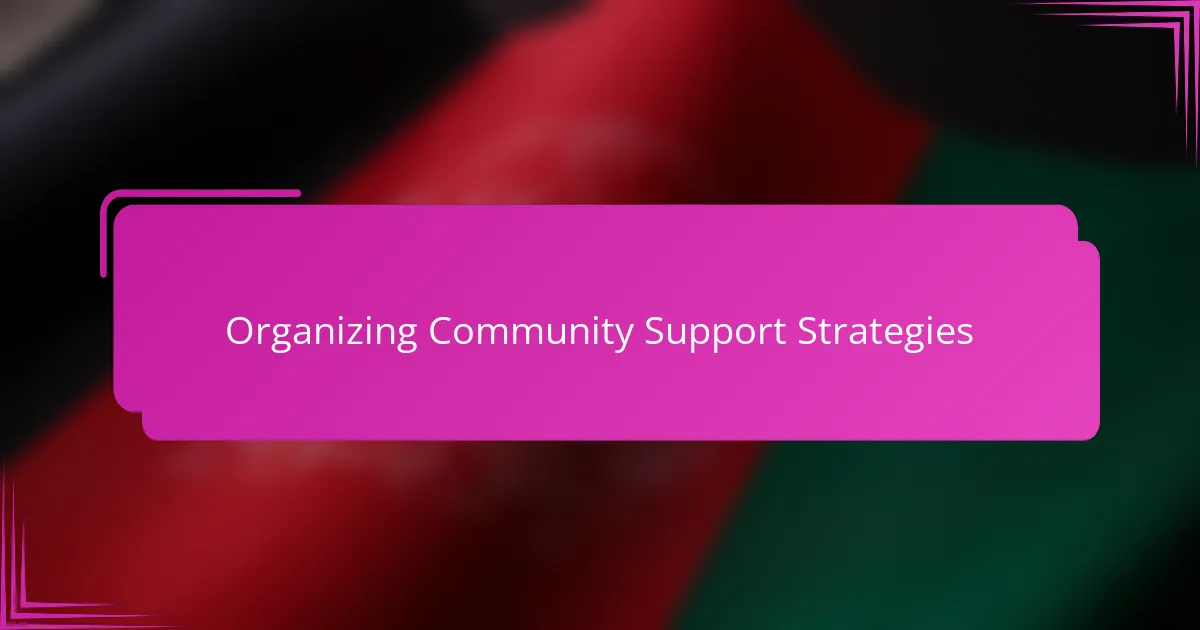
Organizing Community Support Strategies
When I started organizing community support, the first step was identifying key influencers—people whose opinions really matter locally. Have you ever noticed how a single trusted voice can rally a whole neighborhood? I reached out to those individuals, inviting them to small gatherings where we could discuss Republican initiatives openly and honestly.
Planning effective support strategies meant creating spaces for genuine conversation rather than just delivering speeches. At one event, I watched as neighbors shared personal stories that connected deeply with Republican values like self-reliance and economic freedom. Those moments convinced me that fostering real dialogue was more powerful than any flyer or social media post.
One challenge I faced was maintaining momentum after initial enthusiasm. To tackle that, I helped set up weekly check-ins and volunteer groups, which kept everyone engaged and motivated. It made me realize that consistent, organized effort is the backbone of lasting community support—not just one-off events.
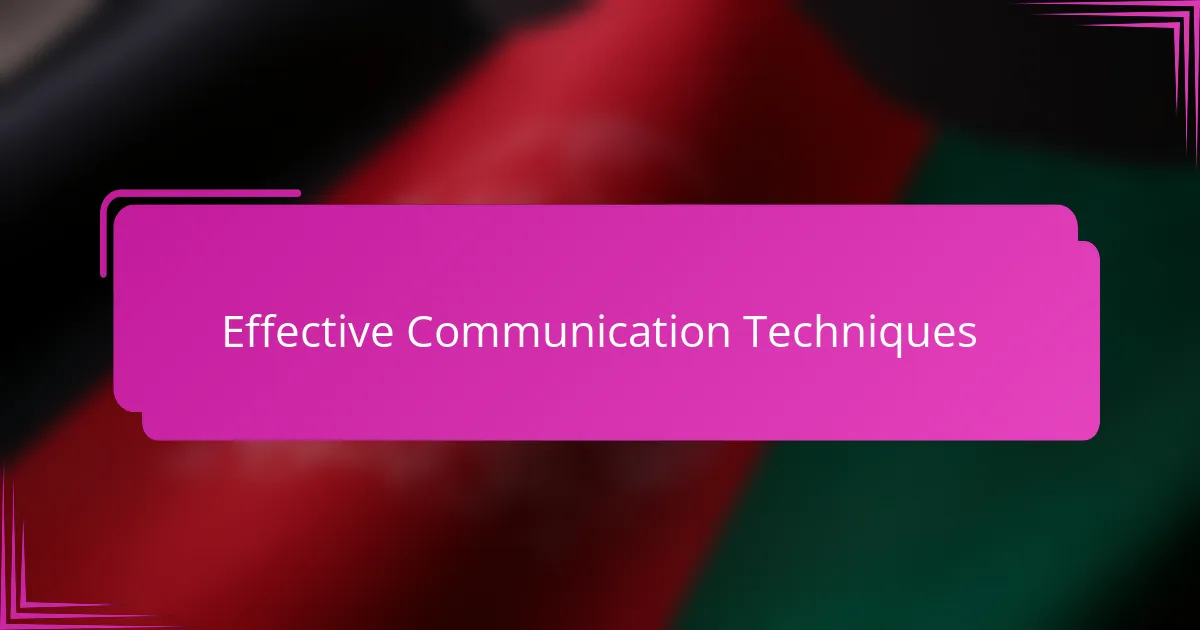
Effective Communication Techniques
Effective communication became my go-to tool when supporting Republican initiatives in my community. I learned that listening carefully and responding thoughtfully opened doors more than any scripted speech ever could. Have you ever felt the difference when someone truly hears your concerns before sharing their own perspective?
One technique that really worked for me was framing messages around shared values—like freedom and responsibility—rather than just policy details. When I spoke at a local gathering, I noticed people became more engaged once they saw how these principles related to their daily lives. It reminded me that connecting emotionally is often more persuasive than reciting statistics.
I also found that asking open-ended questions encouraged others to voice their thoughts and feel part of the conversation. For example, I’d ask neighbors, “What does personal freedom mean to you?” Their answers shaped how I presented Republican ideals, making the dialogue feel authentic and respectful. Isn’t it amazing how a genuine exchange can transform opinions more than any campaign slogan?
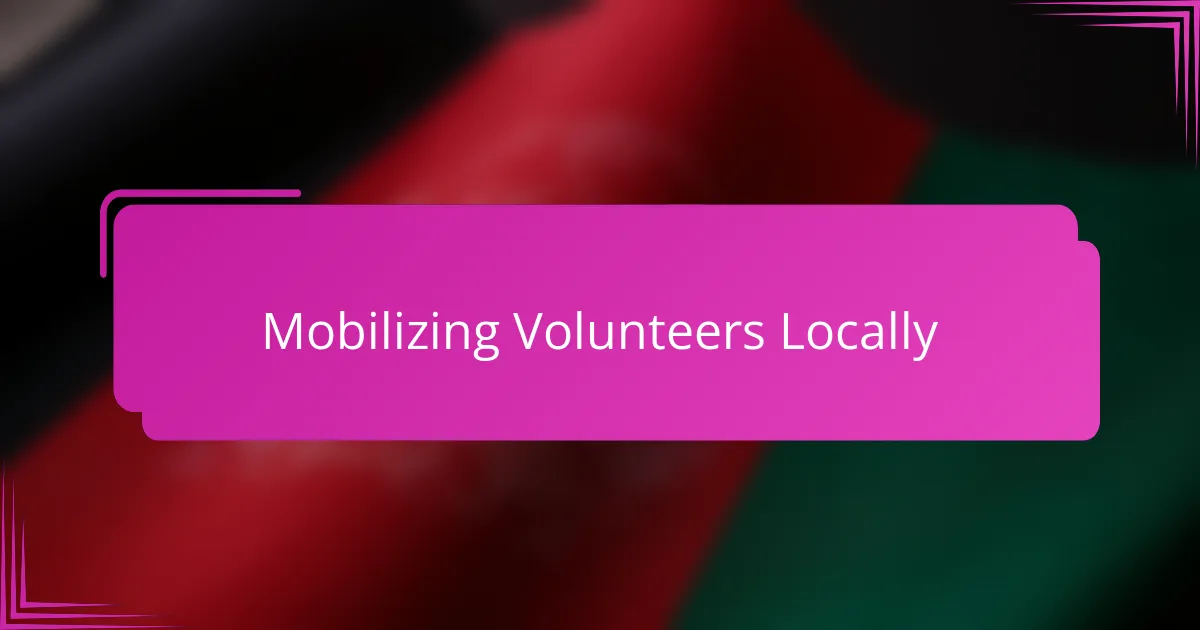
Mobilizing Volunteers Locally
Mobilizing volunteers locally was one of the most rewarding parts of my involvement. I remember organizing a weekend meet-up where neighbors who had never met before came together, energized by a shared conviction to support a Republican initiative. Have you ever experienced that spark when a group of people suddenly feels like a team? That moment made me realize how powerful local volunteer efforts can be.
At first, rallying volunteers felt like an uphill battle—people were busy, skeptical, or unsure how to help. But by breaking tasks into simple, manageable actions like handing out flyers or making reminder calls, I saw hesitation turn into active participation. From my perspective, the key was making everyone feel that their contribution, no matter how small, truly mattered.
What surprised me most was how a few passionate volunteers could inspire dozens more through word of mouth and example. One volunteer shared how inviting just three of her friends to an event doubled our turnout the next week. That ripple effect showed me that mobilizing locally isn’t just about numbers—it’s about building enthusiasm and trust from the ground up.
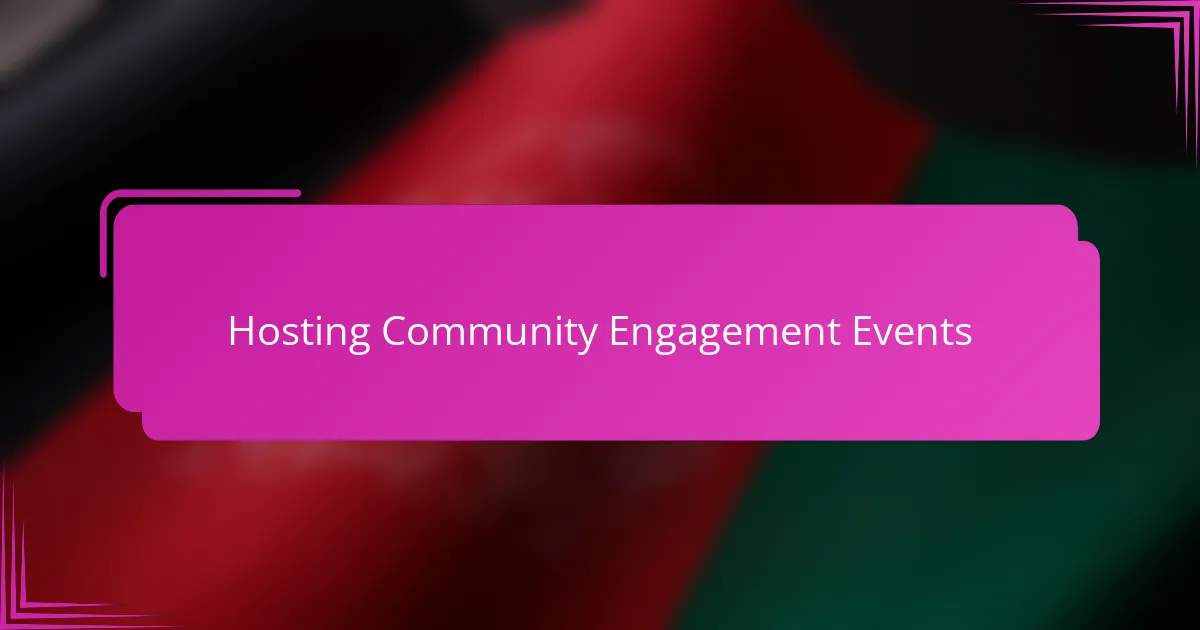
Hosting Community Engagement Events
Hosting community engagement events became one of my favorite ways to connect with neighbors who shared a passion for Republican values. Have you ever noticed how gathering people in a casual setting—like a backyard barbecue or a town hall—creates a space for honest conversations? I found that these events let us move beyond slogans and really listen to each other’s hopes and concerns.
One moment that sticks with me is when a local retired veteran showed up at one of our meetups and spoke about how limited government policies helped him restore a sense of personal responsibility. Hearing that firsthand made the principles come alive in a way no flyer ever could. It reminded me that behind every policy is a human story waiting to be told.
Of course, organizing these events wasn’t always easy—sometimes turnout was low, or the discussions got heated. Yet each gathering reinforced my belief that consistent, face-to-face engagement builds trust faster than any social media campaign. I began to see these events as the heartbeat of community support, where ideas took root through genuine connection.
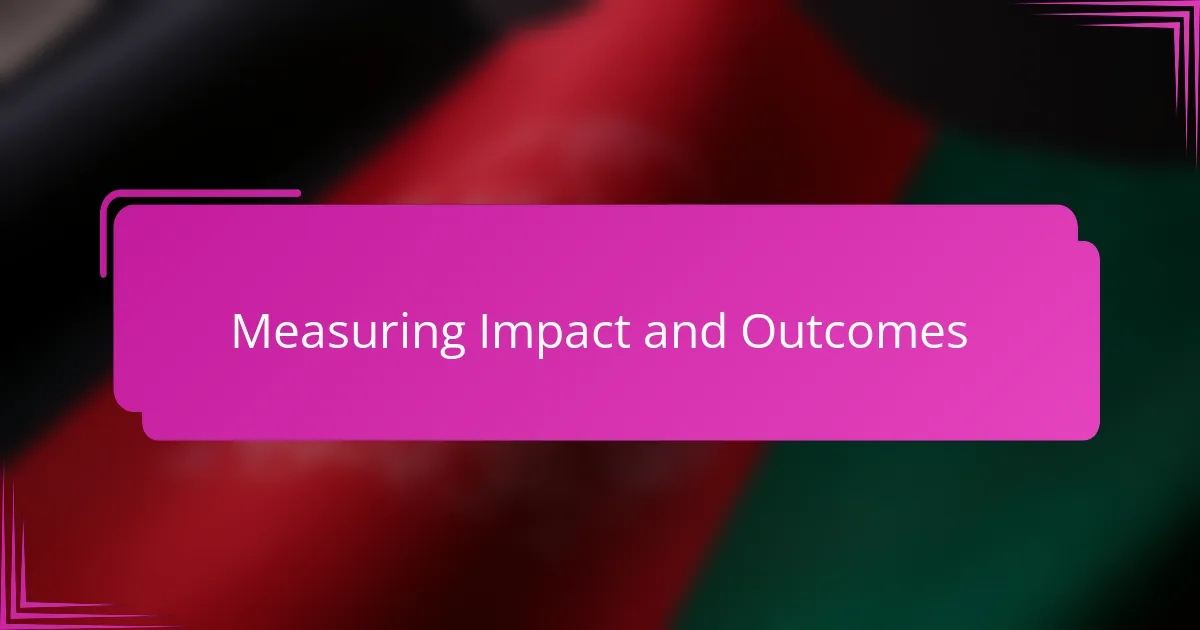
Measuring Impact and Outcomes
Measuring the impact of my support for Republican initiatives wasn’t always straightforward. I often asked myself, “How do you really know if all those conversations and events made a difference?” Tracking changes in community attitudes, like neighbors expressing more confidence in limited government policies, became one tangible way I gauged success.
Another clear indicator came from volunteer engagement. When I noticed more people showing up consistently, sharing their own stories, and taking leadership roles, it told me that the message was resonating beyond just surface-level agreement. Those moments made me realize that outcome isn’t just about numbers—it’s about genuine commitment growing in the community.
I also reflected on specific policy outcomes that gained local traction after our efforts, like increased participation in neighborhood safety programs aligned with Republican principles. Seeing real actions spurred by grassroots support gave me a deep sense of fulfillment, proving that measuring impact means connecting the dots between dialogue, volunteer energy, and lasting community change.